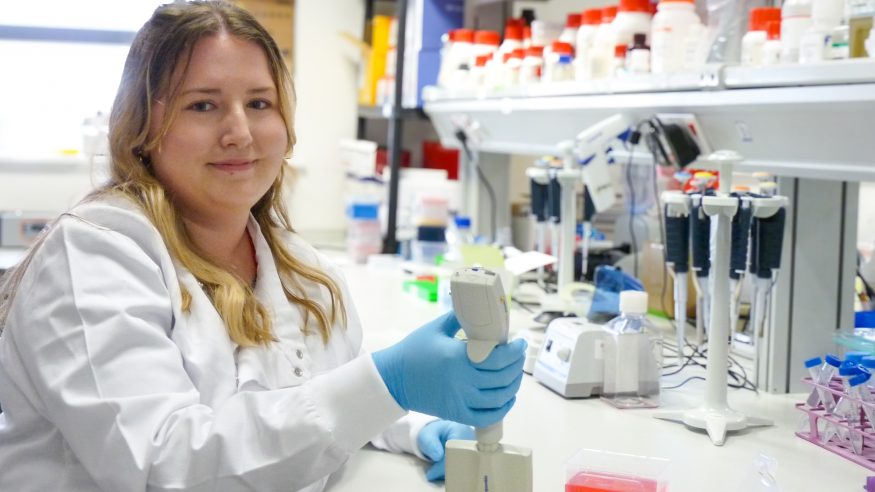Meet the Researcher – Emma Weir
14 June 2024
Emma Weir (Biosciences 2021-) is in the final year of her PhD at Cardiff’s Neuroscience and Mental Health Innovation Institute, looking into the mechanisms of neurodevelopmental disorders such as ADHD, autism, and schizophrenia. She tells us about her work, which aims to give patients more accurate diagnoses and better support sooner.
My research looks at DNA changes that lead to abnormal brain development and increase risk towards neurodevelopmental disorders. We occasionally see big genetic changes in the DNA of a patient, where regions of chromosomes have either been deleted or duplicated. These changes are rare, but they can be a marker to show if someone might develop a neurodevelopmental condition and the likelihood of certain symptoms, such as cognitive impairment, being present. Someone with a mutation could be asymptomatic, or their condition could manifest at a severe level. They may also be unaware they have a genetic risk of developing a condition until they pass this on to their children. My role is to look at the biology behind these duplications and deletions and what this means for patients.
Despite significant advancements, there is still so much we don’t know about the brain, as biopsies on this specific organ are difficult. So, in order to find out more about the link between DNA changes and neurodevelopmental conditions, our team use a special lab technique. By taking blood samples containing patients’ DNA, we can create stem cells to use in the lab. From these stem cells, we can actually grow brain cells and 3D models. These mini brain models – otherwise known as organoids – are essentially genetically identical copies of specific patients’ brains.
These organoids are an incredible game changer for our research. They allow us to recreate the workings of the brain in lab conditions, so we can test theories and treatments that we wouldn’t be able to otherwise. For example, we can use organoids to investigate which types of drugs might work best to ease specific conditions. Our lab team looks at how different cells in the brain change and interact with one another. While I observe how neuron activity is impacted by myelin-making cells, for example, my fellow researchers look at other brain cell types.
Together, our research is helping us to understand the brain in a new and improved way, meaning we can give patients more accurate diagnoses, personalised medical information, and the support they need at an earlier stage. Our collaborative multidisciplinary research is revolutionizing our understanding of the brain, enabling us to provide patients with more accurate diagnoses, personalized medical insights, and timely support at an earlier stage.
Find out more about neuroscience and mental health research at Cardiff University.
- January 2026
- November 2025
- September 2025
- July 2025
- June 2025
- May 2025
- April 2025
- March 2025
- February 2025
- January 2025
- October 2024
- September 2024
- August 2024
- July 2024
- June 2024
- May 2024
- April 2024
- March 2024
- February 2024
- January 2024
- December 2023
- November 2023
- October 2023
- September 2023
- August 2023
- July 2023
- June 2023
- May 2023
- April 2023
- March 2023
- February 2023
- January 2023
- November 2022
- October 2022
- September 2022
- August 2022
- July 2022
- June 2022
- May 2022
- April 2022
- March 2022
- February 2022
- January 2022
- December 2021
- November 2021
- October 2021
- September 2021
- August 2021
- July 2021
- June 2021
- May 2021
- April 2021
- March 2021
- February 2021
- January 2021
- December 2020
- November 2020
- October 2020
- September 2020
- August 2020
- July 2020
- June 2020
- May 2020
- April 2020
- March 2020
- January 2020
- December 2019
- November 2019
- October 2019
- September 2019
- August 2019
- July 2019
- May 2019
- April 2019
- March 2019
- February 2019
- January 2019
- December 2018
- November 2018
- October 2018
- September 2018
- August 2018
- July 2018
- June 2018
- May 2018
- April 2018
- March 2018
- February 2018
- December 2017
- November 2017
- October 2017
- September 2017
- August 2017
- July 2017
- June 2017
- May 2017
- April 2017
- March 2017
- February 2017
- January 2017
- November 2016
- October 2016
- September 2016
- July 2016
- June 2016
- May 2016
- April 2016
- March 2016
- February 2016
- January 2016
- December 2015
- November 2015
- October 2015
- September 2015
- August 2015
- January 2015
- December 2014
- November 2014
- September 2014
- August 2014
- May 2014